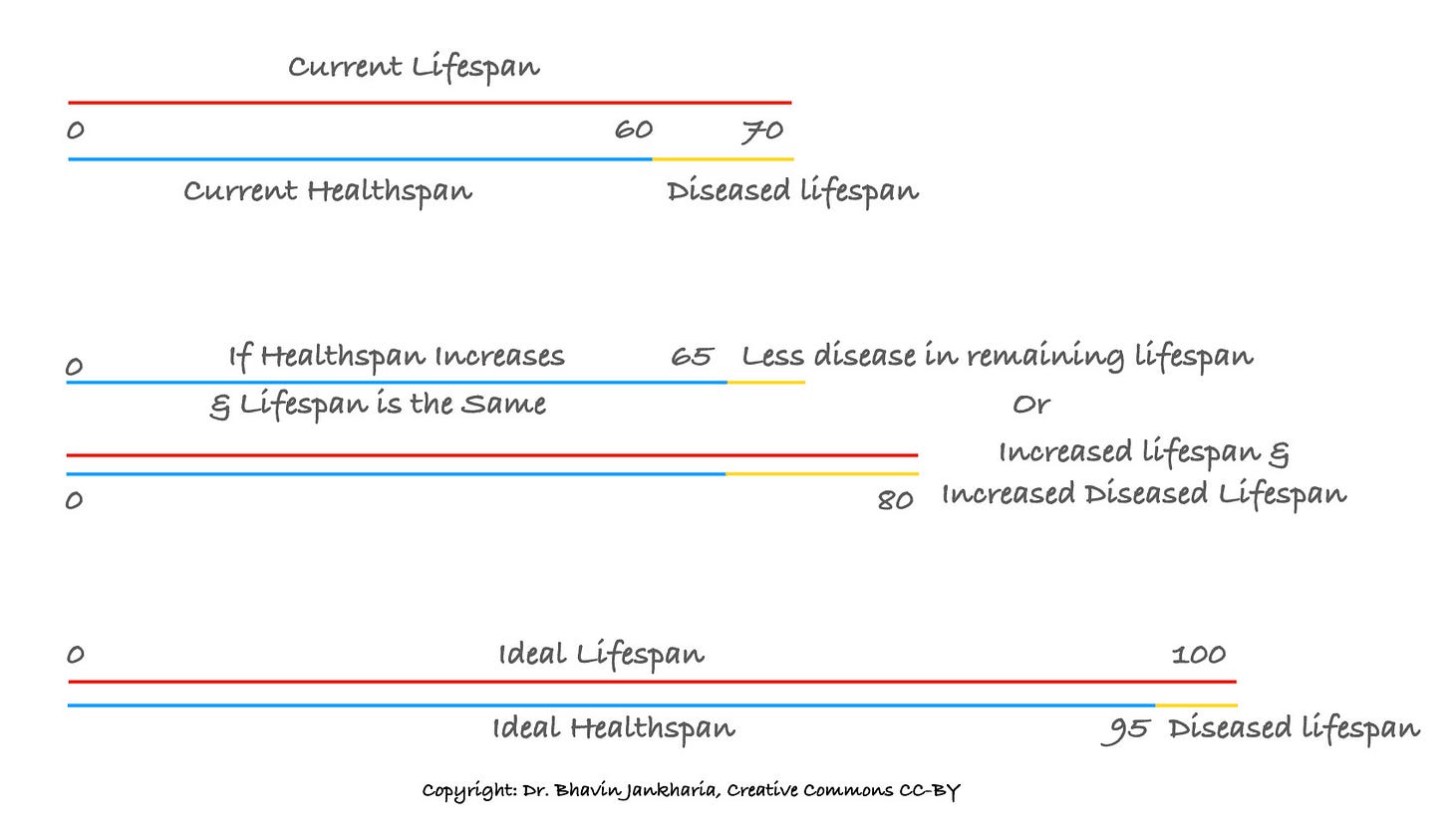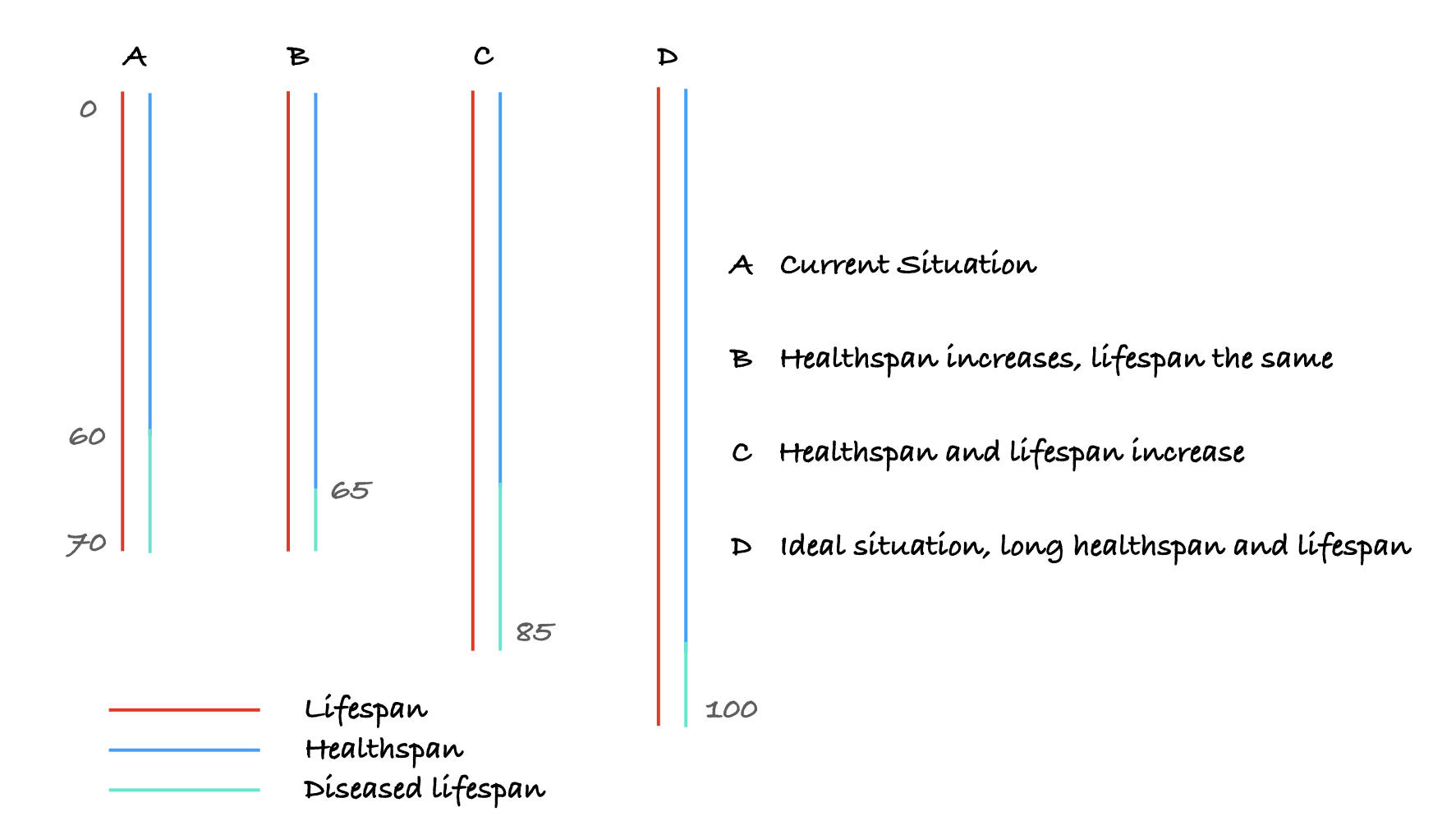Healthspan over Lifespan
A long healthspan is as important as a long lifespan, perhaps more

You can listen to the audio/podcast hosted on Soundcloud by clicking the Play button below within the browser itself.
A man said to the universe:
“Sir, I exist!”
“However,” replied the universe,
“The fact has not created in me
A sense of obligation.”
A Man Said to the Universe, By Stephen Crane
Last month, the 95-years old grand-mother of a friend of mine passed away. When I asked what had happened, they said “she died of old age”. Over the last 5 years she had gradually become more and more frail and then one fine day, she just died. She was one of just 12 lakh (1.2 million) people in India who have lived past the age of 90 years, constituting just 0.1% of India’s population. There are 10 times more people over the age of 80 (i.e. 1% of the population), but with a life-expectancy of just 6.8 years at the age of 80, only 10% of them reach the age of 90.
Jain and other similar philosophies accept “old age” as a cause of death…this is not true of many parts of the world where the authorities always ask for a specific cause of death that often does not include “aging”. Intuitively however, we know that aging itself can eventually lead to death, a concept that is now scientifically finding a resurgence across the world with the thinking that if we delay the aging process, we could live longer, healthier lives.
We already know that despite Covid-19, there has been no better time period to live in, when it comes to living long. The average life expectancy at birth has significantly risen in virtually every country of the world, including India. This increased lifespan is mainly because children are not dying early for a variety reasons that I have written about earlier and are explained beautifully in a new book by Steven Johnson called Extra Life.
But there is a current upper limit to our lives. Very few people in India make it above 80 and a minuscule number makes it to above 90. There is an exponential death rate after the age of 65, which is why, as we age, we keep seeing people around us dropping off faster and faster.
Moreover, the longer we live, the more is the morbidity associated with chronic diseases that afflicts those of us above the age of 50. We live longer but many of us suffer through that longer life.
What is therefore more important than just the lifespan is the healthspan, which is the time period lived until a major disease, such as stroke, heart attack, cancer, etc occurs, which then usually results in an overall reduction in the lifespan, the remaining lifespan often lived with suffering and disability.
Effectively, the longer we live, the more is the chance that we will live with disease and disability. This is the Faustian bargain we have made by adding years to our lives and by significantly reducing childhood mortality. We live longer, but with disease.
As this diagram shows, in India, our average lifespan is almost 70 years. However, the current healthspan is just 60 years, by which time half of us who have managed to reach the age of 60 will have at least one or more chronic disease with some disability/morbidity.

If however, the healthspan were to go up to 65 years, then two things could happen. First, if the overall lifespan continues to remain at 70 years, then the morbidity and disability due to disease would be compressed into a shorter span of just 5 years. Or, more likely, the overall lifespan would be pushed further up to 80 years, with again 10-15 years of life with disease.
The trick would be to increase both healthspan and lifespan, but healthspan relatively more, so that we reduce the number of years with disease to as less as possible, as I have shown at the bottom of the diagram. If we could increase our lifespan to 100 years and healthspan to 95 years, we could compress our years of disease before death to a very short period of time of just 5 odd years.
The upper limit of life though continues to remain a quandary. Despite the overall longevity increase, the number of people that cross 100 years continues to be minuscule, irrespective of whether they have significant disease or continue to remain healthy…and virtually no one reaches 115 years of age.
The presence of an upper limit implies that our bodies have an “aging” process that causes tissues and organs to degenerate, such that eventually we have to die.
While being atmasvasth is about living long, healthy, our focus has generally been to prevent diseases and if they do occur, to try and control them and to avoid disability. But, what if our focus were to change from preventing disease to preventing aging and frailty, with the assumption that if we increase our healthspan, we automatically live long, healthy lives?
Eventual research (which may not pan out in our lifetime), may identify genetic manipulations or senolytic drugs that kill old cells and delay aging and allow us to live longer, healthier lives. In the meantime though, physical activity in any form, eating sensibly, sleeping well, not falling, getting vaccinated, meditating and avoiding tobacco are all steps that can potentially increase our healthspan. David Sinclair has written a fascinating book titled Lifespan on this subject, but more about that in another post.
Maybe therefore it is time to talk about our healthspans rather than just lifespans and do everything we can to have longer healthspans, than just longer lifespans. That is really our atmasvasth quest in the end…to live long, healthy.
And one day we could even add two more lines to Stephen Crane’s poem
A man said to the universe:
“Sir, I exist!”
“However,” replied the universe,
“The fact has not created in me
A sense of obligation.”
“That may be fine sir”, the man retorted,
But I may no longer need anything from you.”
A different version was posted to the TOI

Atmasvasth Newsletter
Join the newsletter to receive the latest updates in your inbox.


